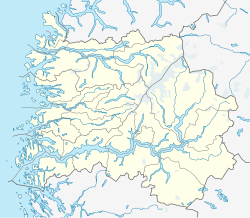Florø Church
| Florø Church | |
|---|---|
| Florø kyrkje | |

View of the church
|
|
| 61°35′57″N 5°01′44″E / 61.5991°N 5.0288°ECoordinates: 61°35′57″N 5°01′44″E / 61.5991°N 5.0288°E | |
| Location |
Flora Municipality, Sogn og Fjordane |
| Country | Norway |
| Denomination | Church of Norway |
| Churchmanship | Evangelical Lutheran |
| History | |
| Consecrated | 8 Nov 1882 |
| Architecture | |
| Status | Parish church |
| Functional status | Active |
| Architect(s) | Jacob Wilhelm Nordan |
| Completed | 1882 |
| Specifications | |
| Capacity | 650 |
| Materials | Wood |
| Administration | |
| Parish | Kinn |
| Deanery | Sunnfjord prosti |
| Diocese | Diocese of Bjørgvin |
Florø Church (Norwegian: Florø kyrkje) is the main parish church in Flora Municipality in Sogn og Fjordane county, Norway. It is located in the town of Florø. The church is part of the Kinn parish in the Sunnfjord deanery in the Diocese of Bjørgvin. The church, which has a seating capacity of 650, was consecrated on 8 November 1882, by the bishop Fredrik W. Hvoslef. The architect Jacob Wilhelm Nordan made the designs.
For the first 22 years after Florø was granted city privileges, it was probably the only city in the country without a church of its own. The city people had to undertake the exhausting voyage to the old Kinn Church on the island of Kinn to be able to attend church services. For obvious reasons, the church issue was a recurrent topic in the Florø city council after 1860.
Florø church is a big church built with a high nave. On either side wall there are five big windows with pointed gables. The chancel is pentagonal with three big windows. All the stained-glass windows are framed in lead. There are two vestries, one for the vicar and one reserved for babies to be christened. The church had an organ for the consecration ceremony in 1882, and this was one of the first organs in the region of Sunnfjord.
The colours in the church are in various shades of grey, repainted in 1999. At the same time the pews were repaired and fitted with cushions. Two rows of pews at the back of the nave have been removed to make space for various exhibits, and also to provide a meeting place for "church coffee" functions. There were no stoves when the church was new, but they were installed five years later in 1887. Only in 1965 did the church get electric heating.
...
Wikipedia


